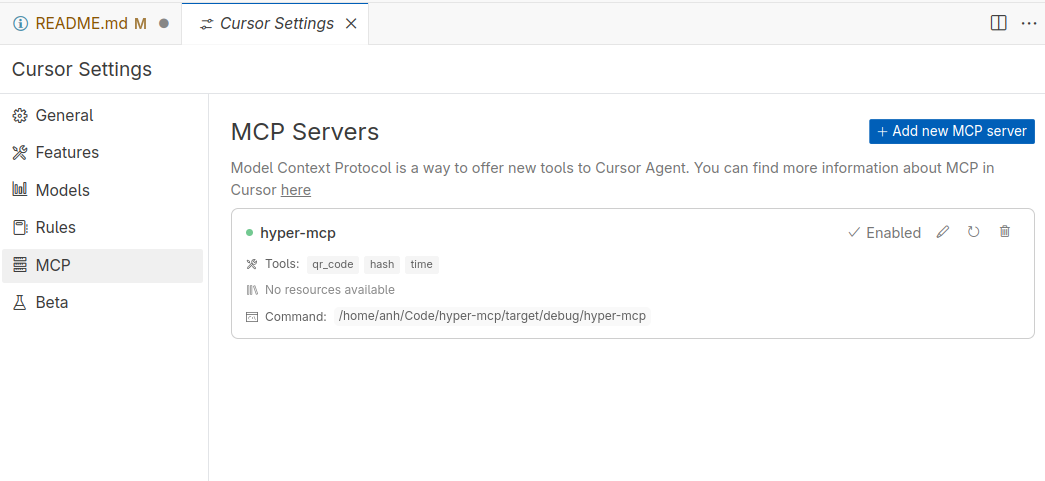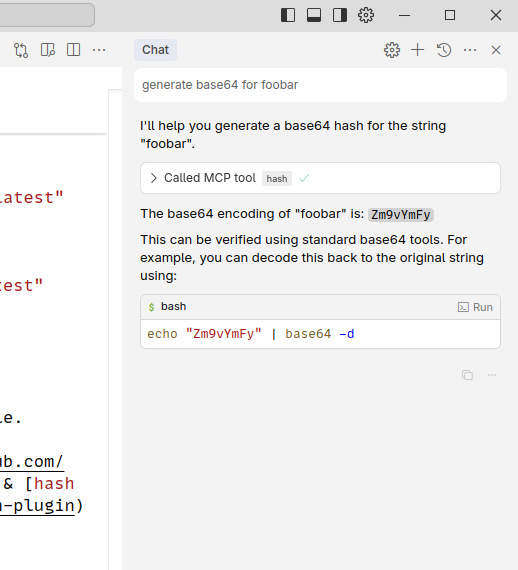- Explore MCP Servers
- hyper-mcp
Hyper Mcp
What is Hyper Mcp
hyper-mcp is a powerful Model Context Protocol (MCP) server that utilizes WebAssembly plugins to enhance its functionality, allowing for a modular and extensible approach to building and running MCP applications.
Use cases
Use cases for hyper-mcp include building custom plugins for data manipulation, integrating with existing applications for enhanced capabilities, and creating a tailored development environment for specific workflows.
How to use
To use hyper-mcp, create a configuration file at ‘$HOME/.config/mcp.json’ where you define the plugins you want to use. After configuring, simply restart the MCP server to apply the changes.
Key features
Key features of hyper-mcp include language agnosticism for plugin development, simple distribution via Dockerfiles, universal compatibility with MCP-compatible applications, and easy configuration through a single config file.
Where to use
hyper-mcp can be used in various fields such as software development, data processing, and any environment that requires modular application functionalities through plugins.
Clients Supporting MCP
The following are the main client software that supports the Model Context Protocol. Click the link to visit the official website for more information.
Overview
What is Hyper Mcp
hyper-mcp is a powerful Model Context Protocol (MCP) server that utilizes WebAssembly plugins to enhance its functionality, allowing for a modular and extensible approach to building and running MCP applications.
Use cases
Use cases for hyper-mcp include building custom plugins for data manipulation, integrating with existing applications for enhanced capabilities, and creating a tailored development environment for specific workflows.
How to use
To use hyper-mcp, create a configuration file at ‘$HOME/.config/mcp.json’ where you define the plugins you want to use. After configuring, simply restart the MCP server to apply the changes.
Key features
Key features of hyper-mcp include language agnosticism for plugin development, simple distribution via Dockerfiles, universal compatibility with MCP-compatible applications, and easy configuration through a single config file.
Where to use
hyper-mcp can be used in various fields such as software development, data processing, and any environment that requires modular application functionalities through plugins.
Clients Supporting MCP
The following are the main client software that supports the Model Context Protocol. Click the link to visit the official website for more information.
Content

hyper-mcp
A fast, secure MCP server that extends its capabilities through WebAssembly plugins.
What is it?
hyper-mcp makes it easy to add AI capabilities to your applications. It works with Claude Desktop, Cursor IDE, and other MCP-compatible apps. Write plugins in your favorite language, distribute them through container registries, and run them anywhere - from cloud to edge.
Features
- Write plugins in any language that compiles to WebAssembly
- Distribute plugins via standard OCI registries (like Docker Hub)
- Built on Extism for rock-solid plugin support
- Lightweight enough for resource-constrained environments
- Support all 3 protocols in the spec:
stdio,sseandstreamble-http. - Deploy anywhere: serverless, edge, mobile, IoT devices
- Cross-platform compatibility out of the box
Security
Built with security-first mindset:
- Sandboxed plugins that can’t access your system without permission
- Memory-safe execution with resource limits
- Secure plugin distribution through container registries
- Fine-grained access control for host functions
- OCI plugin images are signed at publish time and verified at load time with sigstore.
Getting Started
- Create your config file:
- Linux:
$HOME/.config/hyper-mcp/config.json - Windows:
{FOLDERID_RoamingAppData}. Eg:C:\Users\Alice\AppData\Roaming - macOS:
$HOME/Library/Application Support/hyper-mcp/config.json
- Linux:
{
"plugins": [
{
"name": "time",
"path": "oci://ghcr.io/tuananh/time-plugin:latest"
},
{
"name": "qr-code",
"path": "oci://ghcr.io/tuananh/qrcode-plugin:latest"
},
{
"name": "hash",
"path": "oci://ghcr.io/tuananh/hash-plugin:latest"
},
{
"name": "myip",
"path": "oci://ghcr.io/tuananh/myip-plugin:latest",
"runtime_config": {
"allowed_hosts": [
"1.1.1.1"
]
}
},
{
"name": "fetch",
"path": "oci://ghcr.io/tuananh/fetch-plugin:latest",
"runtime_config": {
"allowed_hosts": [
"*"
],
"memory_limit": "100 MB"
}
}
]
}- Start the server:
$ hyper-mcp
- By default, it will use
stdiotransport. If you want to use SSE, use flag--transport sseor streamable HTTP with--transport streamable-http. - If you want to debug, use
RUST_LOG=info. - If you’re loading unsigned OCI plugin, you need to set
insecure_skip_signatureflag or env varHYPER_MCP_INSECURE_SKIP_SIGNATUREtotrue
Using with Cursor IDE
You can configure hyper-mcp either globally for all projects or specifically for individual projects.
- For project-scope configuration, create
.cursor/mcp.jsonin your project root:
{
"mcpServers": {
"hyper-mcp": {
"command": "/path/to/hyper-mcp"
}
}
}-
Set up hyper-mcp in Cursor’s settings:

-
Start using tools through chat:

Available Plugins
We maintain several example plugins to get you started:
- time: Get current time and do time calculations (Rust)
- qr-code: Generate QR codes (Rust)
- hash: Generate various types of hashes (Rust)
- myip: Get your current IP (Rust)
- fetch: Basic webpage fetching (Rust)
- crypto-price: Get cryptocurrency prices (Go)
- fs: File system operations (Rust)
- github: GitHub plugin (Go)
- eval-py: Evaluate Python code with RustPython (Rust)
- arxiv: Search & download arXiv papers (Rust)
- memory: Let you store & retrieve memory, powered by SQLite (Rust)
- sqlite: Interact with SQLite (Rust)
- crates-io: Get crate general information, check crate latest version (Rust)
- gomodule: Get Go modules info, version (Rust)
- qdrant: keeping & retrieving memories to Qdrant vector search engine (Rust)
- gitlab: GitLab plugin (Rust)
- meme-generator: Meme generator (Rust)
- context7: Lookup library documentation (Rust)
- think: Think tool(Rust)
- maven: Maven plugin (Rust)
- serper: Serper web search plugin (Rust)
Community-built plugins
- hackernews: This plugin connects to the Hacker News API to fetch the current top stories and display them with their titles, scores, authors, and URLs.
- release-monitor-id: This plugin retrieves project ID from release-monitoring.org, which helps track versions of released software.
- yahoo-finance: This plugin connects to the Yahoo Finance API to provide stock prices (OHLCV) based on a company name or ticker symbol.
- rand16: This plugen generates random 16 bytes buffer and provides it in base64uri format - very usable for symmetric cryptography online.
Creating Plugins
Check out our example plugins to learn how to build your own.
To publish a plugin:
# example how to build with rust
FROM rust:1.86-slim AS builder
RUN rustup target add wasm32-wasip1 && \
rustup component add rust-std --target wasm32-wasip1 && \
cargo install cargo-auditable
WORKDIR /workspace
COPY . .
RUN cargo fetch
RUN cargo auditable build --release --target wasm32-wasip1
FROM scratch
WORKDIR /
COPY --from=builder /workspace/target/wasm32-wasip1/release/plugin.wasm /plugin.wasm
Then build and push:
docker build -t your-registry/plugin-name . docker push your-registry/plugin-name
License
Star History
Dev Tools Supporting MCP
The following are the main code editors that support the Model Context Protocol. Click the link to visit the official website for more information.














